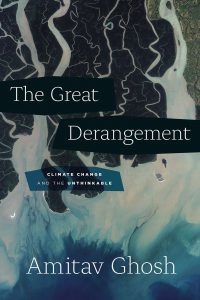Amitav Ghosh interview in BOMB

Amitav Ghosh, on climate change, Ray Bradbury, and “serious fiction,” in conversation with Curt Stager, at BOMB (excerpt after the jump).
***
Curt Stager: You are primarily known as a novelist. What led you to write this nonfiction book?
Amitav Ghosh: Climate change became a matter of personal urgency for me while I was writing my 2005 novel The Hungry Tide. The novel is set in the Sundarbans, the great mangrove forest of the Bengal Delta. While working on the book I realized that this region was already being impacted by rising sea levels and a retreating coastline. In the years after that, even though I was occupied with a project of a different kind (the Ibis trilogy), I found myself becoming more and more preoccupied with climate change—no doubt because the impact was increasingly obvious. After I finished the trilogy, I felt a great need to put down my thoughts on environmental change and its bearing on my practice as a writer. I might add here, that the distinction between fiction and nonfiction is itself beginning to look increasingly strained in this era of anthropogenic climate change.
CS: What, exactly, do you mean by The Great Derangement? Is it related to The Great Acceleration?
AG: The title is indeed a reference to other titles, like The Great Acceleration, The Great Disruption, The Great Divergence, and so on. But the reason I used it, ultimately, is that it was right for the book.
CS: You contrast “serious fiction” with sci-fi, cli-fi, and so on. To me as a scientist, serious fiction sounds like an oxymoron. Can you define it for those of us who are not familiar with the concept?
AG: Certain hierarchical gradations are common to all the arts, and also to the humanities and the sciences. In speaking of painting and sculpture, for example, we often distinguish between “pure” or “high” art and say, craft or artisanship. Similarly, historians distinguish between academic and popular history and scientists draw lines between theoretical, experimental, and popular science. In fiction there is a similar proliferation of categories: literary or “serious” fiction is often set apart from popular fiction and also from various fictional genres—romance, science fiction, and so on. Underlying these distinctions is the idea that genre and popular fiction are constrained by certain conventions and expectations whereas literary fiction is a product of the unconstrained imagination.
I should add here that I do not by any means subscribe to the reasoning behind these distinctions. And to many—such as yourself—these distinctions may well appear trivial. Yet it is incontestably the case that these categories are of great significance in the worlds of art and literature. And that significance is not just aesthetic: it has very important material implications—just think of the difference in the price of a work that is considered art and one that is classified as craft. Moreover, these distinctions create ecosystems that include many structures and institutions—galleries, museums, journals, criticism, festivals, prizes, university courses, etcetera.
It is this ecosystem that I had in mind when I wrote that “climate change casts a much smaller shadow within the landscape of literary fiction than it does even in the public arena.” Anyone who looks at the ecosystem of literary fiction will soon discover that climate change has a very small presence within it. Indeed, when climate change figures at all in serious literary journals it is usually in relation to nonfictional accounts of the subject. Novels and stories that are attentive to climate change are almost automatically relegated to genres such as science fiction, apocalyptic fiction, and so on.
CS: Are you mainly criticizing the ivory tower version of literature? If so, does it really matter outside of academia, as long as the public is into Ray Bradbury?
AG: Does it matter much to the world at large that the very mention of climate change is enough to remove a novel from the mainstream of serious fiction? Probably not, since the general public doesn’t care much about fiction anyway. However, it certainly does matter to me—and only partly because I am myself a writer who has, for most of his life, made his living within the ecosystem of literary fiction. It matters to me mainly because the marginalization of climate change within the ecosystem of fiction seems to me to be symptomatic of something much larger: I think it tells us a great deal about the workings of contemporary culture and our ways of thought. As I wrote in The Great Derangement, “It is very difficult surely to imagine a conception of seriousness that is blind to potentially life-changing threats.”
***
To read the interview in full at BOMB, click here.
To read more about The Great Derangement, click here.